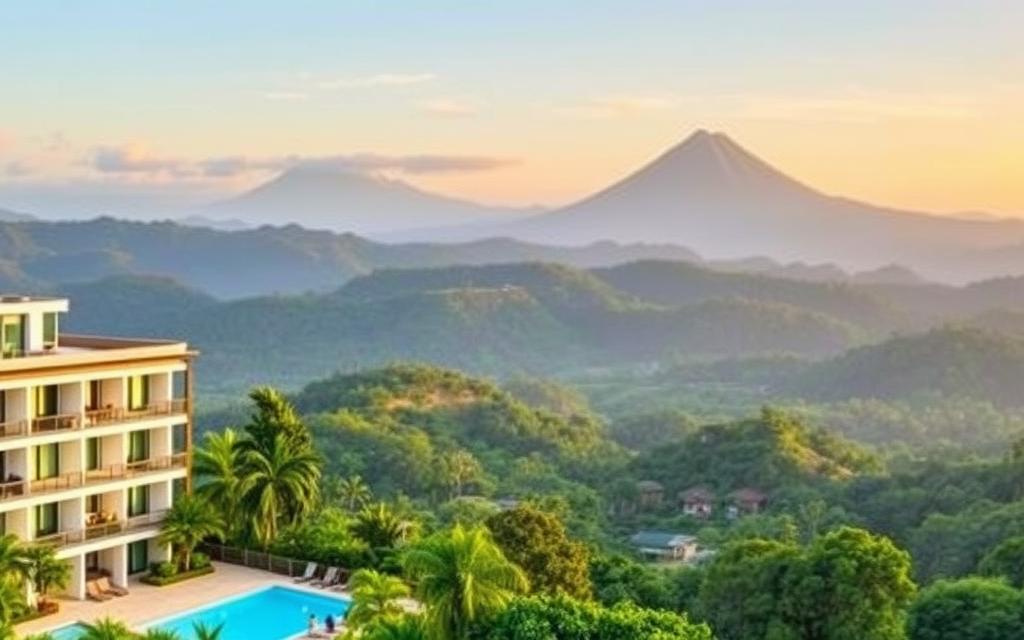Costa Rica Citizenship vs Permanent Residency: What's Best for You?

Did you know that over 500,000 foreigners have chosen to make Costa Rica their home? This small but vibrant country is known for its welcoming environment, mild climate, and stunning natural beauty. Whether you’re seeking a temporary stay or a long-term commitment, understanding your options is key.
This article explores the differences between citizenship and permanent residency in Costa Rica. Both pathways offer unique benefits, from access to healthcare to the ability to live and work in the country. However, the decision depends on your personal goals and circumstances.
With its rich culture and affordable cost of living, Costa Rica is an ideal destination for individuals and families alike. Let’s dive into the details to help you decide which option suits your needs best.
Introduction: Embracing Costa Rica’s Opportunities

Relocating to Costa Rica offers a chance to embrace a vibrant and peaceful environment. This country is known for its welcoming culture, mild climate, and stunning natural beauty. Whether you’re looking for a fresh start or a new adventure, Costa Rica provides a unique blend of opportunities.
The immigration process here is designed to support various residency options, making it easier for individuals and families to settle. From retirees to professionals, many have found success in transitioning to life in this Central American gem. The straightforward legal pathways ensure a smooth process for newcomers.
One of the key attractions is the pleasant climate, which allows for outdoor activities year-round. The cultural richness and sense of community make it easy to integrate and feel at home. Expats often highlight the friendly locals and the laid-back lifestyle as major perks.
For those considering a move, it’s important to understand the residency process and what it entails. Whether you’re planning to work, retire, or invest, Costa Rica offers a range of options to suit your needs. Many families have successfully made the transition, thanks to the country’s supportive policies.
In the sections ahead, we’ll explore the different pathways available, from temporary residency to long-term solutions. Understanding these options will help you make an informed decision about your future in this beautiful country. For more details on the residency process, check out this guide.
Exploring Costa Rica Residency Options

Costa Rica provides diverse residency pathways tailored to different lifestyles and goals. Whether you’re looking to retire, invest, or simply live in this beautiful country, there’s an option for you. Understanding these choices is essential for making an informed decision.
Understanding Rentista, Investment, and Temporary Residency
One popular option is the rentista residency, which requires proof of a steady income. This is ideal for those who can demonstrate a monthly income of at least $2,500. Another pathway is the investment residency, which involves investing a minimum of $150,000 in real estate or other approved projects.
Temporary residency is often the first step for many newcomers. It allows you to live in the country for up to three years while you explore your long-term options. This can later transition into permanent residency or even citizenship.
Key Requirements and Documentation
Applying for residency involves gathering specific documents. These include an apostilled birth certificate, proof of income, and a clean background check. All documents must be translated into Spanish if they’re in another language.
Applicants must also provide financial proof to show they can support themselves. This ensures that you meet the country’s immigration regulations. The process can take several months, so it’s important to plan ahead.
For a detailed guide on the legal requirements, check out this resource. Understanding these steps will help you navigate the process smoothly and avoid common pitfalls.
In-depth Look at Costa Rica citizenship vs permanent residency

Choosing the right path to settle in a new country can be life-changing. Both citizenship and permanent residency offer unique advantages, but they come with different processes and commitments. Understanding these differences is key to making an informed decision.
Benefits and Drawbacks of Each Path
Permanent residency provides the right to live and work in the country without needing a permit. It also grants access to national healthcare and other social benefits. However, it may limit certain rights, such as voting in national elections.
Citizenship, on the other hand, offers full rights, including the ability to vote and hold public office. It also allows for visa-free travel to many countries. However, the process is longer and requires passing a language and culture test.
Comparing Application Processes and Timeframes
The process for permanent residency typically starts with temporary residency, which can convert after three years. Applicants must provide proof of income, a clean background check, and other documents. The entire process can take several months.
Citizenship requires either seven years of residency or marriage to a local. Applicants must also pass a test and demonstrate integration into the culture. This process can take longer but offers greater long-term benefits.
Both pathways require careful planning and adherence to legal requirements. Understanding the steps involved can help you choose the option that aligns with your goals.
Navigating the Costa Rican Citizenship Process

Becoming a citizen of this Central American nation involves a clear and structured process. There are two primary routes: through prolonged residence or marriage. Each path has specific requirements and benefits, making it essential to understand the details before applying.
Citizenship Through Residency
To apply for citizenship through residence, you must first hold permanent residency for at least five years. This period can extend to seven years for some applicants. During this time, you must demonstrate integration into the local culture and society.
Applicants are required to pass a Spanish language test and a social studies exam. These tests ensure you have a basic understanding of the country’s language and history. Additionally, you’ll need to provide a clean criminal background check and proof of income.
The process involves submitting documents like your birth certificate, passport, and residency card. Once approved, you gain full rights, including the ability to vote and hold public office. For more details, check out the Costa Rican dual citizenship requirements.
Citizenship Through Marriage
If you’re married to a local, the process is streamlined. You can apply after two years of marriage, provided you’ve lived together in the country. This route requires proof of your marriage, such as a marriage certificate, and evidence of cohabitation.
Like the residency path, you’ll need to pass the Spanish and social studies tests. However, the waiting period is shorter, making it an attractive option for many. Once granted, you enjoy the same rights as other citizens, including visa-free travel to over 150 countries.
Both pathways require careful preparation and adherence to legal requirements. Understanding the steps involved can help you choose the option that aligns with your goals and ensures a smooth transition to becoming a citizen.
Understanding Legal and Financial Requirements

Navigating the legal and financial requirements is a crucial step in the immigration process. Meeting these criteria ensures eligibility and paves the way for a smooth transition. Whether you’re applying for residency or citizenship, understanding the obligations is essential.
One of the key requirements is providing proof of income. For instance, rentista applicants must demonstrate a steady monthly income of at least $2,500. Investors, on the other hand, need to document their investments, which must meet a minimum threshold of $150,000.
Background checks and certified documentation are equally important. A clean criminal record and an apostilled birth certificate are mandatory. These documents must be translated into Spanish if they’re in another language.
Income Proof and Investment Criteria
Monthly income proofs play a significant role in ensuring eligibility. Applicants must provide financial records that show they can support themselves. This step is not just a legal requirement but also a way to demonstrate financial stability.
Legal service providers can assist in gathering and verifying these documents. Their expertise ensures that all paperwork meets the standards set by immigration authorities. This support can make the process less stressful and more efficient.
Once all documents are prepared, they must be submitted for review. The authorities will assess the application to ensure it meets all criteria. Understanding this process can help applicants prepare adequately and avoid delays.
For more insights into the residency process, check out this guide. Meeting these legal and financial requirements is a vital step toward successful integration and achieving your goals.
Lifestyle Benefits and Quality of Life in Costa Rica
Living in Costa Rica offers a unique blend of natural beauty and cultural richness. This country is known for its pristine beaches, lush rainforests, and vibrant local traditions. For those considering residency, these elements combine to create an enriching lifestyle that’s hard to match.
One of the most appealing aspects is the sense of community. Residents often find it easy to integrate into local neighborhoods, where friendly faces and warm welcomes are the norm. This fosters a sense of belonging and makes it easier to call this place home.
Natural Beauty, Culture, and Community Integration
Costa Rica’s natural landscapes are a major draw. From the stunning Pacific coastline to the dense rainforests, there’s always something to explore. Outdoor enthusiasts can enjoy hiking, surfing, and wildlife spotting, all within a short distance from their homes.
The local culture is equally captivating. Festivals, traditional music, and local cuisine provide endless opportunities for social engagement. These cultural experiences help residents feel connected to the community and deepen their appreciation for the country.
For those seeking a sustainable lifestyle, Costa Rica is a leader in environmental conservation. The government’s commitment to sustainability ensures a clean and healthy environment for residents. This focus on eco-friendly living enhances the overall quality of life.
Legal residents also benefit from access to social and recreational services. These include healthcare, education, and discounts at national parks. Such perks make daily life more enjoyable and stress-free.
If you’re ready to embrace this lifestyle, here’s a guide on what to do after securing your residency. Costa Rica’s welcoming environment and rich culture make it an ideal place to build a fulfilling life.
Conclusion
Deciding between long-term residency and full integration involves careful consideration of your goals. Each option offers distinct benefits, from access to healthcare to the ability to vote. Understanding the legal steps and timelines is essential for making an informed choice.
Residency provides stability and the right to live and work without permits. It’s a practical step for those who want to explore the country before committing further. On the other hand, citizenship grants full rights, including visa-free travel and participation in national elections.
Both pathways require specific steps, such as proving income or passing language tests. Planning ahead ensures a smooth process and aligns with your personal circumstances. Whether you choose residency or citizenship, integrating into the local community enriches your experience.
For tailored guidance, consulting experts can help navigate the complexities. Ultimately, the decision depends on your long-term vision and how deeply you wish to connect with this vibrant nation.


